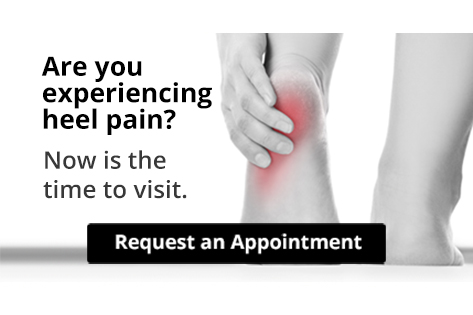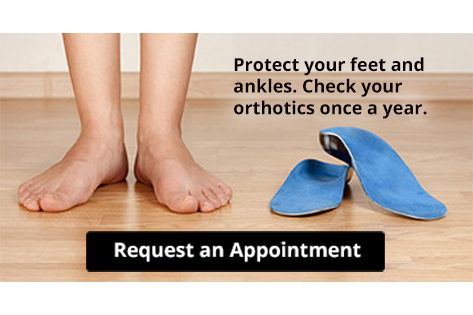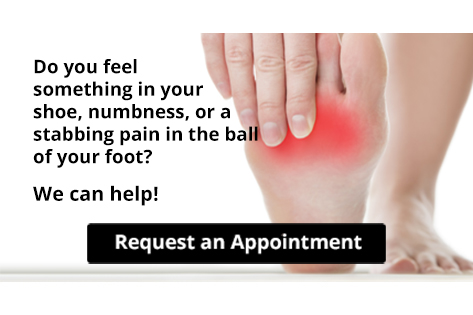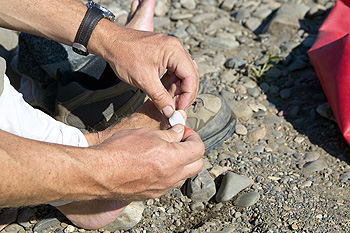Blog
What are the Benefits of Proper Foot Stretching?
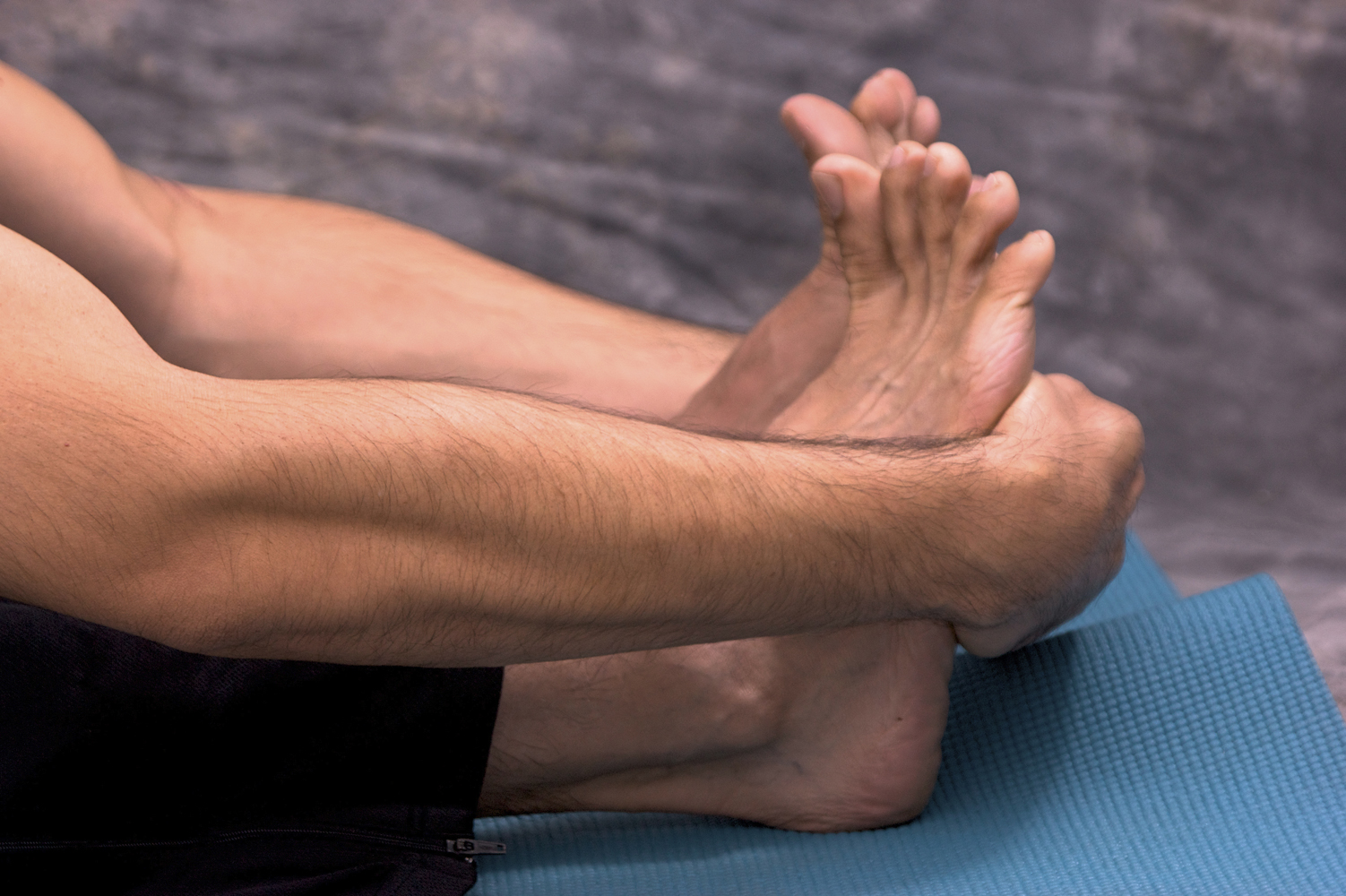 When proper foot stretches are performed, the body may become stronger, and may possibly alleviate certain aches and pains that may be present. An effective stretch that may strengthen the plantar fascia would be to interlace your fingers between your toes, and gently pull while rolling your ankle in small circles. Additionally, a stretch that simulates a massage involves using a tennis ball. When the foot is placed on top of the ball and gently rolled, the ligaments and tendons are stretched, encouraging the muscles of the foot to loosen. A popular foot stretch is known as flexing the foot. While sitting down, hold your foot in your hands and gently pull into an arch. The benefits of this effective stretch include improved strength in the toes in addition to possibly preventing any foot spasms from occurring. Please consult a podiatrist for additional information about the positive effects of proper foot stretching.
When proper foot stretches are performed, the body may become stronger, and may possibly alleviate certain aches and pains that may be present. An effective stretch that may strengthen the plantar fascia would be to interlace your fingers between your toes, and gently pull while rolling your ankle in small circles. Additionally, a stretch that simulates a massage involves using a tennis ball. When the foot is placed on top of the ball and gently rolled, the ligaments and tendons are stretched, encouraging the muscles of the foot to loosen. A popular foot stretch is known as flexing the foot. While sitting down, hold your foot in your hands and gently pull into an arch. The benefits of this effective stretch include improved strength in the toes in addition to possibly preventing any foot spasms from occurring. Please consult a podiatrist for additional information about the positive effects of proper foot stretching.
Stretching the feet is a great way to prevent injuries. If you have any concerns with your feet consult with Shaun J. Limon, DPM and Lisa Griffith-Limon, DPM from Limons Foot & Ankle Care. Our doctors will assess your condition and provide you with quality foot and ankle treatment.
Stretching the Feet
Stretching the muscles in the foot is an important part in any physical activity. Feet that are tight can lead to less flexibility and make you more prone to injury. One of the most common forms of foot pain, plantar fasciitis, can be stretched out to help ease the pain. Stretching can not only ease pain from plantar fasciitis but also prevent it as well. However, it is important to see a podiatrist first if stretching is right for you. Podiatrists can also recommend other ways to stretch your feet. Once you know whether stretching is right for you, here are some excellent stretches you can do.
- Using a foam roller or any cylindrical object (a water bottle or soda can will do), roll the object under your foot back and forth. You should also exert pressure on the object. Be sure to do this to both feet for a minute. Do this exercise three times each.
- Similar to the previous one, take a ball, such as a tennis ball, and roll it under your foot while seated and exert pressure on it.
- Grab a resistance band or towel and take a seat. If you are using a towel, fold it length wise. Next put either one between the ball of your foot and heel and pull with both hands on each side towards you. Hold this for 15 seconds and then switch feet. Do this three times for each foot.
- Finally hold your big toe while crossing one leg over the other. Pull the toe towards you and hold for 15 seconds. Once again do this three times per foot.
It is best to go easy when first stretching your foot and work your way up. If your foot starts hurting, stop exercising and ice and rest the foot. It is advised to then see a podiatrist for help.
If you have any questions, please feel free to contact our offices located in Bradenton and Lakewood Ranch, FL . We offer the newest diagnostic and treatment technologies for all your foot care needs.
Read more about Stretching Your FeetHeel Pain Can Be Treated!
Causes of Flat Feet
 Flat feet is a common foot condition that affects millions of Americans. The feet are the foundation of the body, and any misalignment that occurs from flat feet may affect the rest of it. An assessment is often performed to determine the severity of one's flat feet. The ankles may show signs of turning in, and this can an individual’s gait. There are several reasons why flat feet develop, such as an injury that has occurred, diseases like diabetes, or conditions that may develop from arthritis, which may alter the structure of the foot. You may notice pain and swelling surrounding the ankle, and this is a general sign that this condition may be present. Visit a podiatrist for a proper evaluation and possible treatment options.
Flat feet is a common foot condition that affects millions of Americans. The feet are the foundation of the body, and any misalignment that occurs from flat feet may affect the rest of it. An assessment is often performed to determine the severity of one's flat feet. The ankles may show signs of turning in, and this can an individual’s gait. There are several reasons why flat feet develop, such as an injury that has occurred, diseases like diabetes, or conditions that may develop from arthritis, which may alter the structure of the foot. You may notice pain and swelling surrounding the ankle, and this is a general sign that this condition may be present. Visit a podiatrist for a proper evaluation and possible treatment options.
Flatfoot is a condition many people suffer from. If you have flat feet, contact Shaun J. Limon, DPM and Lisa Griffith-Limon, DPM from Limons Foot & Ankle Care. Our doctors will treat your foot and ankle needs.
What Are Flat Feet?
Flatfoot is a condition in which the arch of the foot is depressed and the sole of the foot is almost completely in contact with the ground. About 20-30% of the population generally has flat feet because their arches never formed during growth.
Conditions & Problems:
Having flat feet makes it difficult to run or walk because of the stress placed on the ankles.
Alignment – The general alignment of your legs can be disrupted, because the ankles move inward which can cause major discomfort.
Knees – If you have complications with your knees, flat feet can be a contributor to arthritis in that area.
Symptoms
- Pain around the heel or arch area
- Trouble standing on the tip toe
- Swelling around the inside of the ankle
- Flat look to one or both feet
- Having your shoes feel uneven when worn
Treatment
If you are experiencing pain and stress on the foot you may weaken the posterior tibial tendon, which runs around the inside of the ankle.
If you have any questions please feel free to contact our offices located in Bradenton and Lakewood Ranch, FL . We offer the newest diagnostic and treatment technologies for all your foot and ankle needs.
Read more about Flat FeetWhat is the Most Common Place for Falls to Occur?
 If you should experience a fall, it may not only produce physical distress, but can also incur extreme financial costs. Severe injuries may be the result of a fall, and this may aid in the rise of unwanted medical expenses. Unnatural feelings can be produced by falling, and research has shown there are several ways to prevent this from occurring. It’s important to wear shoes that fit correctly, and having slip-resistance soles may aid in the prevention of falls. Unsurprisingly, the environment in the home may account for the majority of falls occurring. This generally results from carpets that may have loosened from the floor or liquids that may have spill, causing the floor to become slippery. It’s important to use a railing while walking up or down the stairs, and utilizing a handrail in the shower may be beneficial in keeping your balance. Incorporating exercise into your daily routine will strengthen the body and may possibly help avoid falling.
If you should experience a fall, it may not only produce physical distress, but can also incur extreme financial costs. Severe injuries may be the result of a fall, and this may aid in the rise of unwanted medical expenses. Unnatural feelings can be produced by falling, and research has shown there are several ways to prevent this from occurring. It’s important to wear shoes that fit correctly, and having slip-resistance soles may aid in the prevention of falls. Unsurprisingly, the environment in the home may account for the majority of falls occurring. This generally results from carpets that may have loosened from the floor or liquids that may have spill, causing the floor to become slippery. It’s important to use a railing while walking up or down the stairs, and utilizing a handrail in the shower may be beneficial in keeping your balance. Incorporating exercise into your daily routine will strengthen the body and may possibly help avoid falling.
Preventing falls among the elderly is very important. If you are older and have fallen or fear that you are prone to falling, consult with Shaun J. Limon, DPM and Lisa Griffith-Limon, DPM from Limons Foot & Ankle Care. Our doctors will assess your condition and provide you with quality advice and care.
Every 11 seconds, an elderly American is being treated in an emergency room for a fall related injury. Falls are the leading cause of head and hip injuries for those 65 and older. Due to decreases in strength, balance, senses, and lack of awareness, elderly persons are very susceptible to falling. Thankfully, there are a number of things older persons can do to prevent falls.
How to Prevent Falls
Some effective methods that older persons can do to prevent falls include:
- Enrolling in strength and balance exercise program to increase balance and strength
- Periodically having your sight and hearing checked
- Discuss any medications you have with a doctor to see if it increases the risk of falling
- Clearing the house of falling hazards and installing devices like grab bars and railings
- Utilizing a walker or cane
- Wearing shoes that provide good support and cushioning
- Talking to family members about falling and increasing awareness
Falling can be a traumatic and embarrassing experience for elderly persons; this can make them less willing to leave the house, and less willing to talk to someone about their fears of falling. Doing such things, however, will increase the likelihood of tripping or losing one’s balance. Knowing the causes of falling and how to prevent them is the best way to mitigate the risk of serious injury.
If you have any questions, please feel free to contact our offices located in Bradenton and Lakewood Ranch, FL . We offer the newest diagnostic and treatment technologies for all your foot care needs.
Read more about Falls PreventionReminder: When Was the Last Time...?
Is Morton’s Neuroma Painful?
 A condition referred to as Morton’s neuroma generally causes severe pain on the ball of the foot or between the toes. The plantar nerve undergoes degeneration and as a result, it becomes thickened and inflamed. Women are more prone to acquire this condition because of the stress and pressure endured by the feet, which is generally caused by the type of footwear that is worn. The symptoms of this ailment typically consist of pain that is experienced between the third and fourth toes or on the bottom of the feet. The pain will often follow a feeling of numbness or tingling and may increase during intense activities. Treatment may consist of incorporating lifestyle changes, including choosing to wear shoes that fit correctly and avoiding any extreme and excessive activities. Please consider scheduling a consultation with a podiatrist for a proper diagnosis and to learn about the best treatment options for you, which may include surgery.
A condition referred to as Morton’s neuroma generally causes severe pain on the ball of the foot or between the toes. The plantar nerve undergoes degeneration and as a result, it becomes thickened and inflamed. Women are more prone to acquire this condition because of the stress and pressure endured by the feet, which is generally caused by the type of footwear that is worn. The symptoms of this ailment typically consist of pain that is experienced between the third and fourth toes or on the bottom of the feet. The pain will often follow a feeling of numbness or tingling and may increase during intense activities. Treatment may consist of incorporating lifestyle changes, including choosing to wear shoes that fit correctly and avoiding any extreme and excessive activities. Please consider scheduling a consultation with a podiatrist for a proper diagnosis and to learn about the best treatment options for you, which may include surgery.
Morton’s neuroma is a very uncomfortable condition to live with. If you think you have Morton’s neuroma, contact Shaun J. Limon, DPM and Lisa Griffith-Limon, DPM of Limons Foot & Ankle Care. Our doctors will attend to all of your foot care needs and answer any of your related questions.
Morton’s Neuroma
Morton's neuroma is a painful foot condition that commonly affects the areas between the second and third or third and fourth toe, although other areas of the foot are also susceptible. Morton’s neuroma is caused by an inflamed nerve in the foot that is being squeezed and aggravated by surrounding bones.
What Increases the Chances of Having Morton’s Neuroma?
- Ill-fitting high heels or shoes that add pressure to the toe or foot
- Jogging, running or any sport that involves constant impact to the foot
- Flat feet, bunions, and any other foot deformities
Morton’s neuroma is a very treatable condition. Orthotics and shoe inserts can often be used to alleviate the pain on the forefront of the feet. In more severe cases, corticosteroids can also be prescribed. In order to figure out the best treatment for your neuroma, it’s recommended to seek the care of a podiatrist who can diagnose your condition and provide different treatment options.
If you have any questions, please feel free to contact our offices located in Bradenton and Lakewood Ranch, FL . We offer the newest diagnostic and treatment technologies for all your foot care needs.
Read more about Morton's NeuromaThe Importance of Maintaining Proper Foot Care for Elders
 It’s important to maintain proper foot care, and it’s especially wise if you are elderly. When your feet feel good, it’s easier to stay active by incorporating walking into your daily routine. The benefits of this include possibly preventing falls from occurring as a result of having strong feet, in addition to sustaining proper balance. Recent research has suggested that by monitoring the health of your feet, certain complications may become noticeable, such as arthritis and poor blood circulation. There are several measures that can be taken to ensure proper foot care, including trimming the toenails frequently, washing the feet daily, and utilizing a moisturizer that aids in keeping the skin soft. If it's difficult to bend down to complete the necessary tasks that are needed to maintain proper foot care, please consult with a podiatrist for assistance.
It’s important to maintain proper foot care, and it’s especially wise if you are elderly. When your feet feel good, it’s easier to stay active by incorporating walking into your daily routine. The benefits of this include possibly preventing falls from occurring as a result of having strong feet, in addition to sustaining proper balance. Recent research has suggested that by monitoring the health of your feet, certain complications may become noticeable, such as arthritis and poor blood circulation. There are several measures that can be taken to ensure proper foot care, including trimming the toenails frequently, washing the feet daily, and utilizing a moisturizer that aids in keeping the skin soft. If it's difficult to bend down to complete the necessary tasks that are needed to maintain proper foot care, please consult with a podiatrist for assistance.
Proper foot care is something many older adults forget to consider. If you have any concerns about your feet and ankles, contact Shaun J. Limon, DPM and Lisa Griffith-Limon, DPM from Limons Foot & Ankle Care. Our doctors can provide the care you need to keep you pain-free and on your feet.
The Elderly and Their Feet
As we age we start to notice many changes in our body, but the elder population may not notice them right away. Medical conditions may prevent the elderly to take notice of their foot health right away. Poor vision is a lead contributor to not taking action for the elderly.
Common Conditions
- Neuropathy – can reduce feeling in the feet and can hide many life-threatening medical conditions.
- Reduced flexibility – prevents the ability of proper toenail trimming, and foot cleaning. If left untreated, it may lead to further medical issues.
- Foot sores – amongst the older population can be serious before they are discovered. Some of the problematic conditions they may face are:
- Gouging toenails affecting nearby toe
- Shoes that don’t fit properly
- Pressure sores
- Loss of circulation in legs & feet
- Edema & swelling of feet and ankles
Susceptible Infections
Diabetes and poor circulation can cause general loss of sensitivity over the years, turning a simple cut into a serious issue.
If you have any questions please feel free to contact our offices located in Bradenton and Lakewood Ranch, FL . We offer the newest diagnostic and treatment technologies for all your foot and ankle needs.
Read more about Elderly and their FeetWhy Live with Pain and Numbness in Your Feet?
Symptoms of Rheumatoid Arthritis
 If you are experiencing swelling, pain and stiffness in the toes, you may have what is referred to as rheumatoid arthritis. The toes are consistently bent in a downward position, making it difficult to walk. Additionally, it’s common for bunions to develop, which is a small bony protrusion on the side of the big toe. Many people endure pain in the entire foot, and will often notice the nails have become separated from the nail bed. In the desire to obtain relief the gait is often altered affecting the ball of the foot. Recent research has shown that it may be beneficial to wear shoes that provide adequate room for the toes to move about freely, in addition to avoid wearing high heels. There are several ways to treat this condition depending on the extent of the damage that has been incurred. If you are afflicted with this condition it’s suggested to schedule a consultation with a podiatrist to determine the severity of this ailment, and discuss the best treatments options available.
If you are experiencing swelling, pain and stiffness in the toes, you may have what is referred to as rheumatoid arthritis. The toes are consistently bent in a downward position, making it difficult to walk. Additionally, it’s common for bunions to develop, which is a small bony protrusion on the side of the big toe. Many people endure pain in the entire foot, and will often notice the nails have become separated from the nail bed. In the desire to obtain relief the gait is often altered affecting the ball of the foot. Recent research has shown that it may be beneficial to wear shoes that provide adequate room for the toes to move about freely, in addition to avoid wearing high heels. There are several ways to treat this condition depending on the extent of the damage that has been incurred. If you are afflicted with this condition it’s suggested to schedule a consultation with a podiatrist to determine the severity of this ailment, and discuss the best treatments options available.
Because RA affects more than just your joints, including the joints in your feet and ankles, it is important to seek early diagnosis from your podiatrist if you feel like the pain in your feet might be caused by RA. For more information, contact Shaun J. Limon, DPM and Lisa Griffith-Limon, DPM of Limons Foot & Ankle Care. Our doctors will assist you with all of your podiatric concerns.
What Is Rheumatoid Arthritis?
Rheumatoid Arthritis (RA) is an autoimmune disorder in which the body’s own immune system attacks the membranes surrounding the joints. Inflammation of the lining and eventually the destruction of the joint’s cartilage and bone occur, causing severe pain and immobility.
Rheumatoid Arthritis of the Feet
Although RA usually attacks multiple bones and joints throughout the entire body, almost 90 percent of cases result in pain in the foot or ankle area.
Symptoms
- Swelling and pain in the feet
- Stiffness in the feet
- Pain on the ball or sole of feet
- Joint shift and deformation
Diagnosis
Quick diagnosis of RA in the feet is important so that the podiatrist can treat the area effectively. Your doctor will ask you about your medical history, occupation, and lifestyle to determine the origin of the condition. Rheumatoid Factor tests help to determine if someone is affected by the disease.
If you have any questions please feel free to contact our offices located in Bradenton and Lakewood Ranch, FL . We offer the newest diagnostic and treatment technologies for all your foot and ankle needs.
Read more about Rheumatoid Arthritis in the FeetCan Winter Cause Cracked Heels?
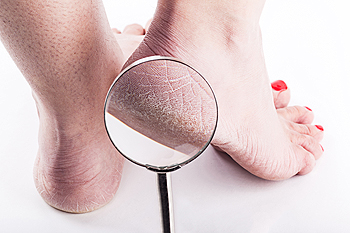 Winter can bring on many ailments, including skin on the heels that split, which is often referred to as cracked heels. Typically, this originates from dry skin, and the cold weather may cause the skin to lose moisture. If this is coupled with other conditions, such as diabetes or circulation issues, the results may lead to developing cracked heels. There are several symptoms of this ailment, often including itching, and the skin becoming thick and possibly flaking. If the fissures, or cracks, in the skin become severe, the possibility of an infection may occur. Prevention of this condition can consist of utilizing a moisturizer on your feet while paying extra attention when applying cream to the heels. Recent research has suggested that eating a diet consisting of fruits and vegetables may help to prevent cracked heels from the inside out. Please consider a consultation with a podiatrist if you have cracked heels and would like additional information.
Winter can bring on many ailments, including skin on the heels that split, which is often referred to as cracked heels. Typically, this originates from dry skin, and the cold weather may cause the skin to lose moisture. If this is coupled with other conditions, such as diabetes or circulation issues, the results may lead to developing cracked heels. There are several symptoms of this ailment, often including itching, and the skin becoming thick and possibly flaking. If the fissures, or cracks, in the skin become severe, the possibility of an infection may occur. Prevention of this condition can consist of utilizing a moisturizer on your feet while paying extra attention when applying cream to the heels. Recent research has suggested that eating a diet consisting of fruits and vegetables may help to prevent cracked heels from the inside out. Please consider a consultation with a podiatrist if you have cracked heels and would like additional information.
Cracked heels are unsightly and can cause further damage to your shoes and feet. If you have any concerns, contact Shaun J. Limon, DPM and Lisa Griffith-Limon, DPM from Limons Foot & Ankle Care. Our doctors can provide the care you need to keep you pain-free and on your feet.
Cracked Heels
Cracked heels appear unappealing and can make it harder for you walk around in sandals. Aside from looking unpleasant, cracked heels can also tear stockings, socks, and wear out your shoes. There are several methods to help restore a cracked heel and prevent further damage.
How Do You Get Them?
Dry skin is the number one culprit in creating cracked heels. Many athletes, walkers, joggers, and even swimmers suffer from cracked heels. Age and skin oil production play a role to getting cracked heels as well.
Promote Healing
Over the counter medicines can help, especially for those that need instant relief or who suffer from chronic dry feet.
Wear Socks – Wearing socks with medicated creams helps lock in moisture.
Moisturizers – Applying both day and night will help alleviate dryness which causes cracking.
Pumice Stones – These exfoliate and remove dead skin, which allows for smoother moisturizer application and better absorption into the skin.
Change in Diet
Eating healthy with a well-balanced diet will give the skin a fresh and radiant look. Your body responds to the kinds of food you ingest. Omega-3 fatty acids and zinc supplements can also revitalize skin tissue.
Most importantly, seek professional help if unsure how to proceed in treating cracked heels. A podiatrist will help you with any questions or information needed.
If you have any questions, please feel free to contact our offices located in Bradenton and Lakewood Ranch, FL . We offer the newest diagnostic and treatment technologies for all your foot care needs.
Read more about Solutions for Cracked HeelsMore...
Do Your Child's Feet Hurt?
Possible Causes of Bunions
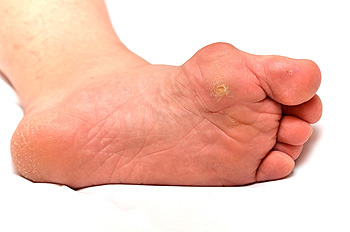 A lump that is hard, swollen, and red that forms on the outside edge of the foot is referred to as a bunion. It typically causes pain and discomfort and often becomes worse by wearing tight shoes. The big toe commonly turns out toward the other toes, and the skin is painful when the bunion is touched. Additionally, it may feel warm, which may be a result of inflammation. Having a predisposed, inherited gene is a contributing factor for this condition. Once it’s confirmed that you have the ailment, a decision will be necessary for treatment. Although removal of the bunion through surgery is the permanent way to relieve yourself of this condition, there may be a level of comfort that can be attained by purchasing shoes that are wider to accommodate the bunion. Additionally, specialty insoles and bunion pads may aid in providing relief. If you are experiencing discomfort from a bunion, a consultation with a podiatrist is suggested.
A lump that is hard, swollen, and red that forms on the outside edge of the foot is referred to as a bunion. It typically causes pain and discomfort and often becomes worse by wearing tight shoes. The big toe commonly turns out toward the other toes, and the skin is painful when the bunion is touched. Additionally, it may feel warm, which may be a result of inflammation. Having a predisposed, inherited gene is a contributing factor for this condition. Once it’s confirmed that you have the ailment, a decision will be necessary for treatment. Although removal of the bunion through surgery is the permanent way to relieve yourself of this condition, there may be a level of comfort that can be attained by purchasing shoes that are wider to accommodate the bunion. Additionally, specialty insoles and bunion pads may aid in providing relief. If you are experiencing discomfort from a bunion, a consultation with a podiatrist is suggested.
If you are suffering from bunions, contact Shaun J. Limon, DPM and Lisa Griffith-Limon, DPM of Limons Foot & Ankle Care. Our doctors can provide the care you need to keep you pain-free and on your feet.
What Is a Bunion?
A bunion is formed of swollen tissue or an enlargement of boney growth, usually located at the base joint of the toe that connects to the foot. The swelling occurs due to the bones in the big toe shifting inward, which impacts the other toes of the foot. This causes the area around the base of the big toe to become inflamed and painful.
Why Do Bunions Form?
Genetics – Susceptibility to bunions are often hereditary
Stress on the feet – Poorly fitted and uncomfortable footwear that places stress on feet, such as heels, can worsen existing bunions
How Are Bunions Diagnosed?
Doctors often perform two tests – blood tests and x-rays – when trying to diagnose bunions, especially in the early stages of development. Blood tests help determine if the foot pain is being caused by something else, such as arthritis, while x-rays provide a clear picture of your bone structure to your doctor.
How Are Bunions Treated?
- Refrain from wearing heels or similar shoes that cause discomfort
- Select wider shoes that can provide more comfort and reduce pain
- Anti-inflammatory and pain management drugs
- Orthotics or foot inserts
- Surgery
If you have any questions, please feel free to contact our offices located in Bradenton and Lakewood Ranch, FL . We offer the newest diagnostic and treatment technologies for all your foot care needs.
Read more about BunionsHow to Prevent Blisters on the Feet
If you see a small area filled with clear fluid on your foot, you may have what is referred to as blister. It’s common for joggers to develop blisters on the feet, and their running is often compromised. Pain and discomfort are often associated with blisters, and the best way to avoid this condition from occurring is to be aware of how to prevent it. It’s important to wear running shoes that fit correctly, and this includes choosing a shoe size that is bigger than shoes that are worn while not running. Additionally, there are socks that are designed specifically for running, and blisters may not form as rapidly when worn. Typically, the best way to treat a blister is to leave it alone, and it will heal on its own. If it bursts and becomes infected, a bandage may be necessary to cover it for protection. Please schedule a consultation with a podiatrist if you would like information about blisters on the feet and how to treat them.
Blisters are prone to making everyday activities extremely uncomfortable. If your feet are hurting, contact Shaun J. Limon, DPM and Lisa Griffith-Limon, DPM of Limons Foot & Ankle Care. Our doctors can provide the care you need to keep you pain-free and on your feet.
Foot Blisters
Foot blisters develop as a result of constantly wearing tight or ill-fitting footwear. This happens due to the constant rubbing from the shoe, which can often lead to pain.
What Are Foot Blisters?
A foot blister is a small fluid-filled pocket that forms on the upper-most layer of the skin. Blisters are filled with clear fluid and can lead to blood drainage or pus if the area becomes infected.
How Do Blisters Form?
Blisters on the feet are often the result of constant friction of skin and material, usually by shoe rubbing. Walking in sandals, boots, or shoes that don’t fit properly for long periods of time can result in a blister. Having consistent foot moisture and humidity can easily lead to blister formation.
Prevention & Treatment
It is important to properly care for the affected area in order to prevent infection and ease the pain. Do not lance the blister and use a Band-Aid to provide pain relief. Also, be sure to keep your feet dry and wear proper fitting shoes. If you see blood or pus in a blister, seek assistance from a podiatrist.
If you have any questions, please feel free to contact our offices located in Bradenton and Lakewood Ranch, FL . We offer the newest diagnostic and treatment technologies for all your foot care needs.
Read more about Blisters on the Feet